Dr Anil K Suresh and team exploring novel domains of research at SRM AP!
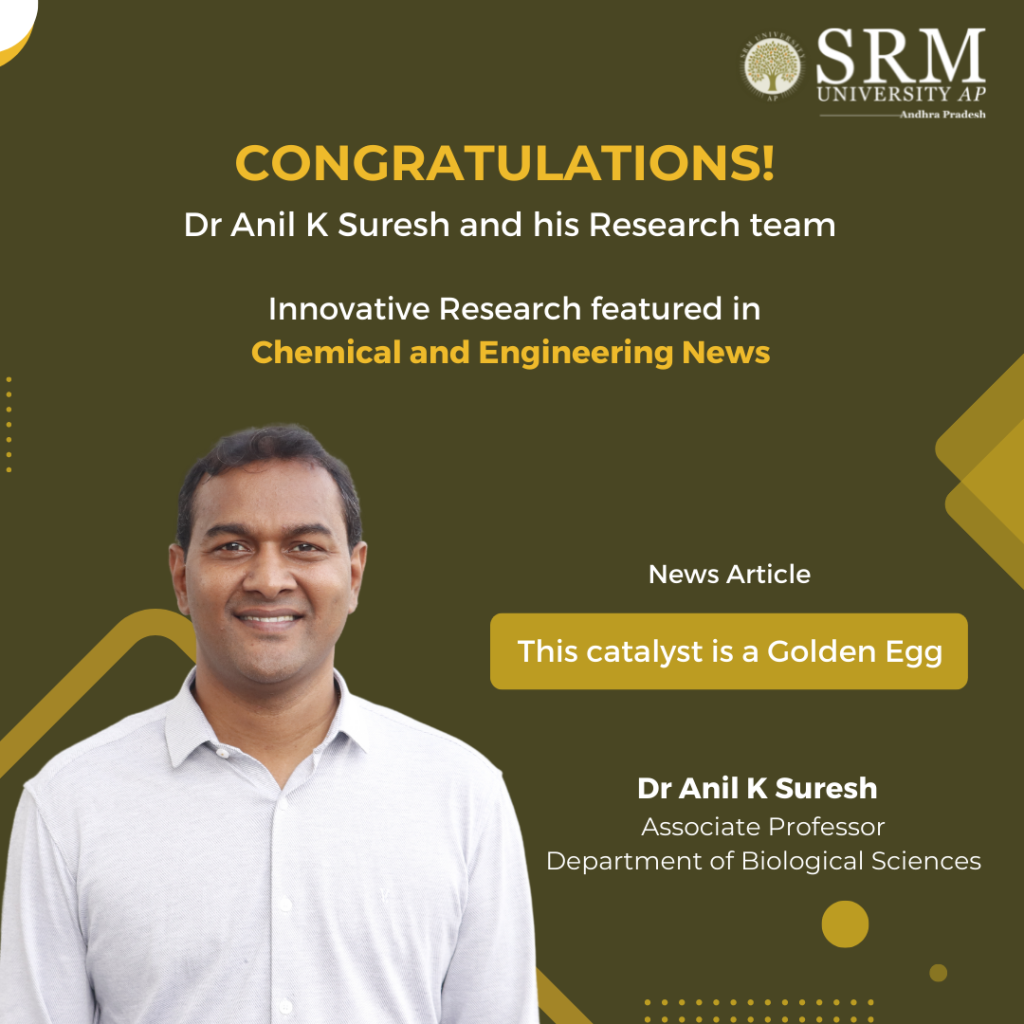
SRM AP proudly congratulates Dr Anil K Suresh, Associate Professor, Department of Biological Sciences and his cohort of research scholars for their rare achievement of having their paper featured in the prestigious weekly news magazine Chemical and Engineering News (ACS-C&EN). The news article titled “This catalyst is a Golden Egg“, edited by Prachi Patel highlights the innovative research conducted by Dr Anil K Suresh and his team on developing a low-cost, sustainable catalyst by infusing eggshells with gold nanoparticles that can be reused and eventually recycled.
The research paper titled Sustainable Bio-Engineering of Gold structured Wide-Area Supported Catalyst for Hand-Recyclable Ultra-Efficient Heterogeneous Catalysis (ACS Appl. Mater. Interfaces 2022, DOI: 10.1021/acsami.2c13564) highlights the team’s breakthrough advance in impregnating eggshells with gold nanoparticles to develop a cheap, and reusable ‘mega catalyst’. The research has used the robust “mega catalyst” to detoxify dye waste and run other organic reactions by dropping the eggshell catalyst into reaction solutions.
Dr Suresh and colleagues dipped waste eggshells collected from restaurants in a suspension containing gold chloride for 6 hours. Consequently, the amino acids on the shells reduced the gold ions to form crystalline gold nanoparticles. Dr Suresh attested this method to be one of the simplest syntheses of a supported catalyst that was ever reported. He emphasised that he and his colleagues have also grafted catalytic silver and copper oxide on eggshells and are now working on methods to do this for platinum and palladium.
SRM University-AP manifests pioneering advancement in innovative domains of research in the field of science and technology. The breakthrough research by Dr Anil K Suresh and his research team is of outstanding achievement and incredible addition to the institution’s laurels in the field of translational research.
- Published in Biology News, Departmental News, Faculty Achievements, News, Research News
Dr Raviteja KVNS Received the Best Paper Award at TRACE 2022
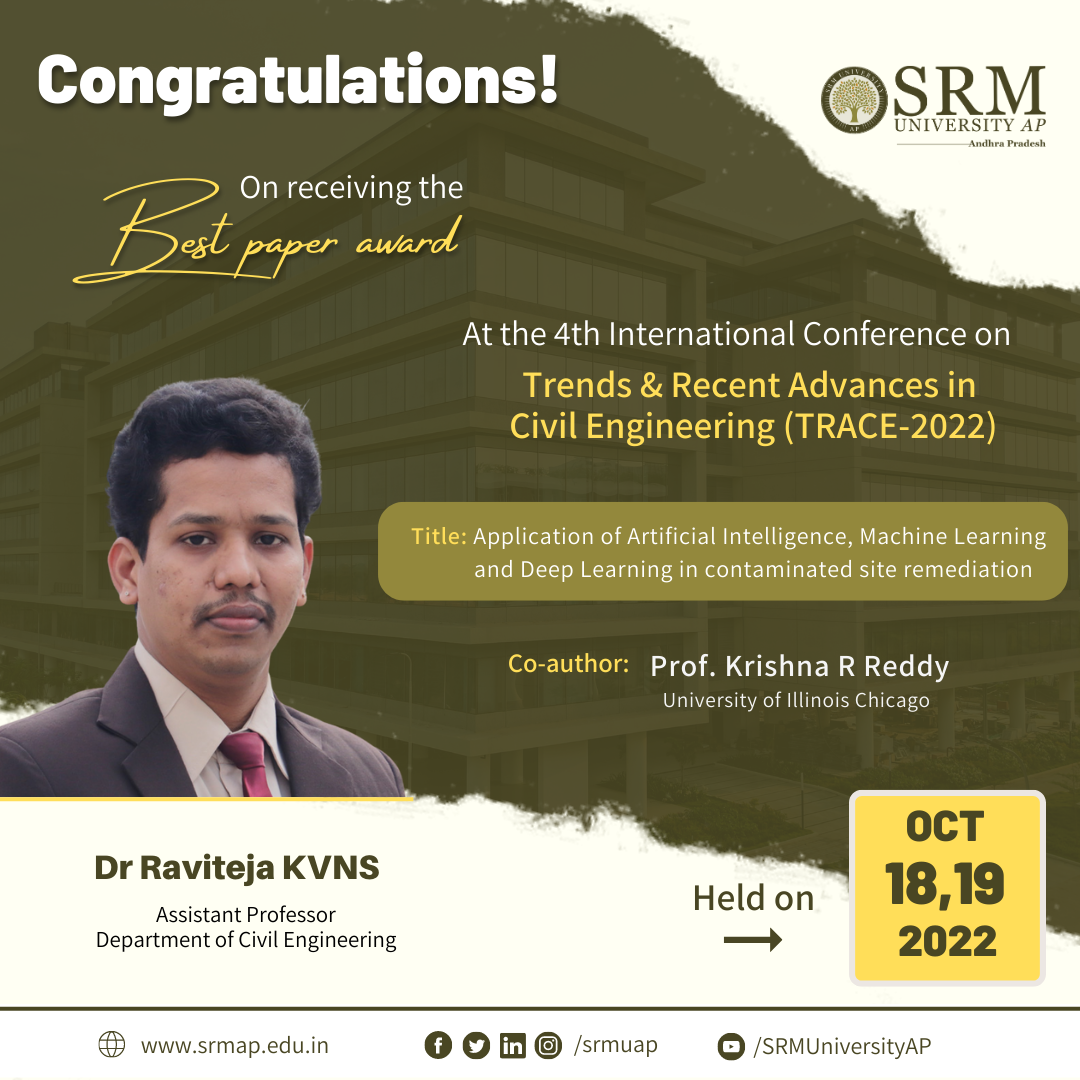 Soil and groundwater contamination is closely interlinked with human society because of its direct impact on population health and socioeconomic activities. The design and implementation of site remediation can be expensive, time-consuming, and may require much human effort. Emerging technologies such as Artificial Intelligence, Machine Learning, and Deep Learning have the potential to make site remediation cost-effective with reduced human effort.
Soil and groundwater contamination is closely interlinked with human society because of its direct impact on population health and socioeconomic activities. The design and implementation of site remediation can be expensive, time-consuming, and may require much human effort. Emerging technologies such as Artificial Intelligence, Machine Learning, and Deep Learning have the potential to make site remediation cost-effective with reduced human effort.
Assistant Professor Dr Raviteja KVNS, Department of Civil Engineering, has received the Best Paper Award at the Fourth International Conference on Trends and Recent Advances in Civil Engineering (TRACE) 2022 for his paper Application of artificial intelligence, machine learning and deep learning in contaminated site remediation. The conference was held at Amity University, Uttar Pradesh, on October 18 and 19, 2022. His research reports the applications of AI and ML in contaminated site remediation.
Dr Raviteja’s future research plan includes studying potential applications of various AI, ML and DL techniques for Geotechnical and Geo-environmental design and testing applications so as to reduce the labours of physical and repetitive testing and associated human effort. This further improves precision as well as aids in decision-making. He has collaborated with Prof. Krishna R Reddy, University of Illinois Chicago, for this research work.
Abstract
Soil and groundwater contamination is caused by improper waste disposal practices and accidental spills, posing a threat to public health and the environment. It is imperative to assess and remediate these contaminated sites to protect public health and the environment as well as to assure sustainable development. Site remediation is inherently complex due to the many variables involved, such as contamination chemistry, fate and transport, geology, and hydrogeology. The selection of remediation method also depends on the contaminant type and distribution and subsurface soil and groundwater conditions. Depending on the type of remediation method, many systems and operating variables can affect the remedial efficiency. The design and implementation of site remediation can be expensive, time-consuming, and may require much human effort. Emerging technologies such as Artificial Intelligence, Machine Learning, and Deep Learning have the potential to make site remediation cost-effective with reduced human effort. This study provides a brief overview of these emerging technologies and presents case studies demonstrating how these technologies can help contaminated site remediation decisions.
- Published in CIVIL NEWS, Departmental News, Faculty Achievements, News, Research News
When Innovation meets Compassion: Dr Sunitha’s Noble Initiative
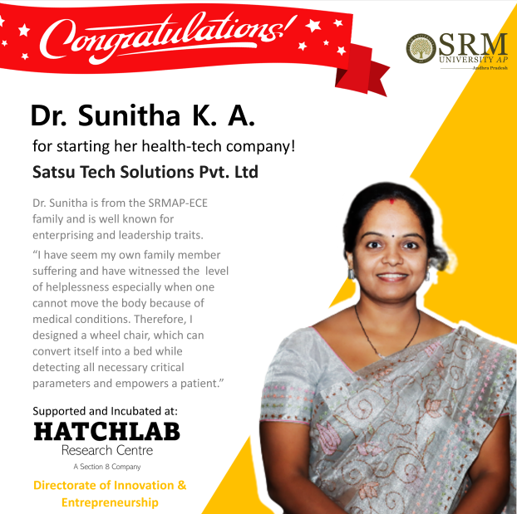
The Directorate of Entrepreneurship and Innovation steps forth with yet another brave initiative from Dr Sunitha K A, Associate Professor, the Department of Electronics and Communication Engineering. Dr Sunitha had envisioned a dream to empower patients suffering from ailments that require sustained medical assistance with a specially designed convertible wheelchair that can aid the patients in mobility and self-help. In association with Hatchlab Research Centre, Dr Sunitha has initiated a health-tech startup exclusively for patients who cannot move their bodies due to several medical conditions and to raise awareness of the continuing rise of similar cases in today’s society.
Dr Sunitha says, “The main challenge of the patient is to perform the basic movements like coming out of the bed and to sit in the wheelchair (and vice-versa), and it is almost impossible for a patient to do this simple act without external support of a person or a nurse. We have listed several such scenarios and cases where our specially designed wheelchair can be converted into a bed and can be easily controlled by the patient itself. Apart from that, all the necessary inputs like the urine levels in the drop-bag, pulse rate, emergency indicated, oxygen levels and several other parameters are well integrated into the system itself which displays in the dashboard and is communicated to the stakeholders.”
The prototype for the convertible wheelchair has been successfully tested and appreciated by doctors and experts in Chennai. With the help of Hatchlab Research Centre, the prime focus for the next few months is to create a completely functional prototype. The innovative venture plans to recreate the fully functional prototype, seed funding and round one funding from the investors, followed by large-scale production. Several multinational design patents for the product have already been filed by Dr Sunitha, and the next stage of the cohort is the commercialisation of the product.
- Published in Departmental News, ECE NEWS, Faculty Achievements, IDEA NEWS, News
Young Researcher Award 2022
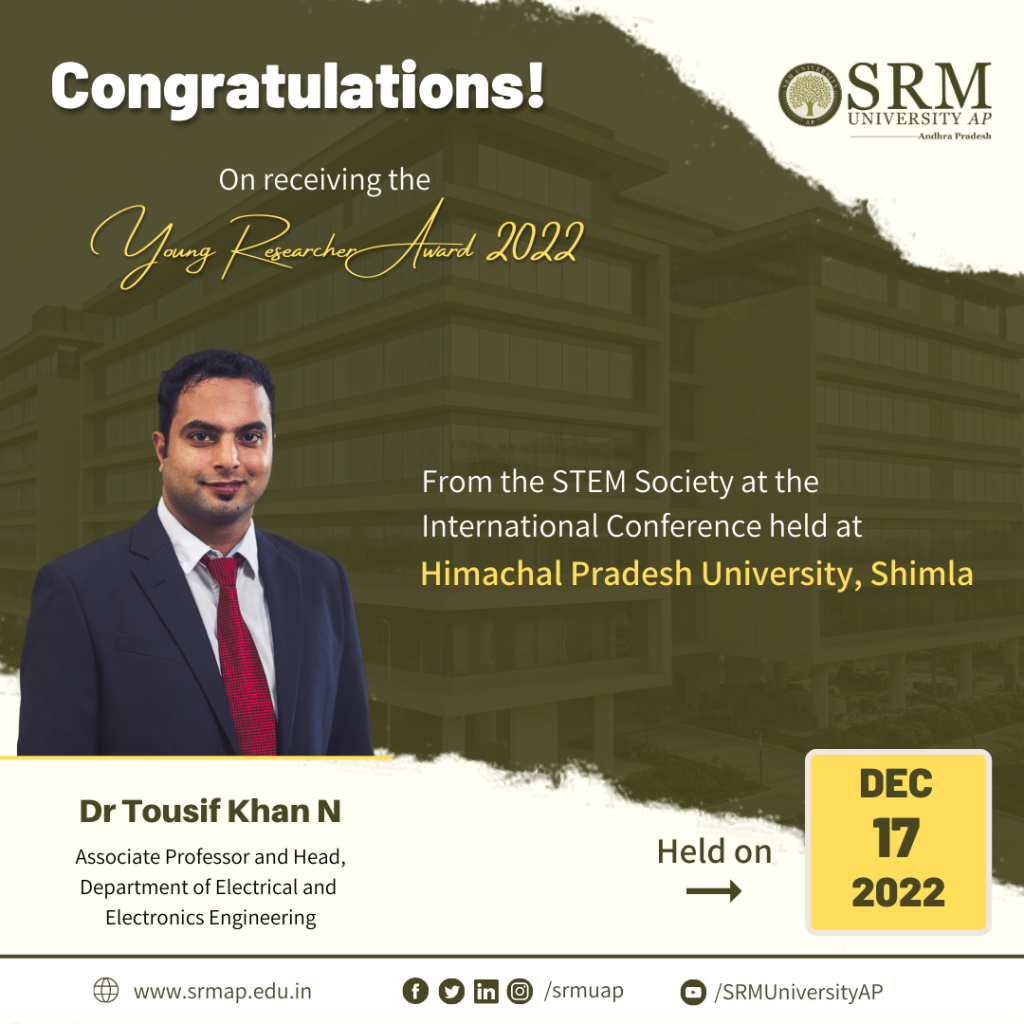
Dr Tousif Khan, Associate Professor and Head, Department of Electrical and Electronics Engineering has been awarded the “Young Researcher Award 2022” by the STEM Society at the International Conference organised at Himachal Pradesh University, Shimla on December 17, 2022. The basic purpose of the STEM-RS is to bring together Researchers, Academicians, Industrialists and Experts from different parts of the country and the world, to exchange knowledge and breakthrough ideas at a common platform by organising national and international events such as Conferences, Seminars and Workshops that unite the Science, Technology, Engineering and Management for the empowerment of research and development.
- Published in Departmental News, EEE NEWS, Faculty Achievements, News
Reshaping the world: Dr M Mallikarjuna Rao Establishes Novel Start-up Venture
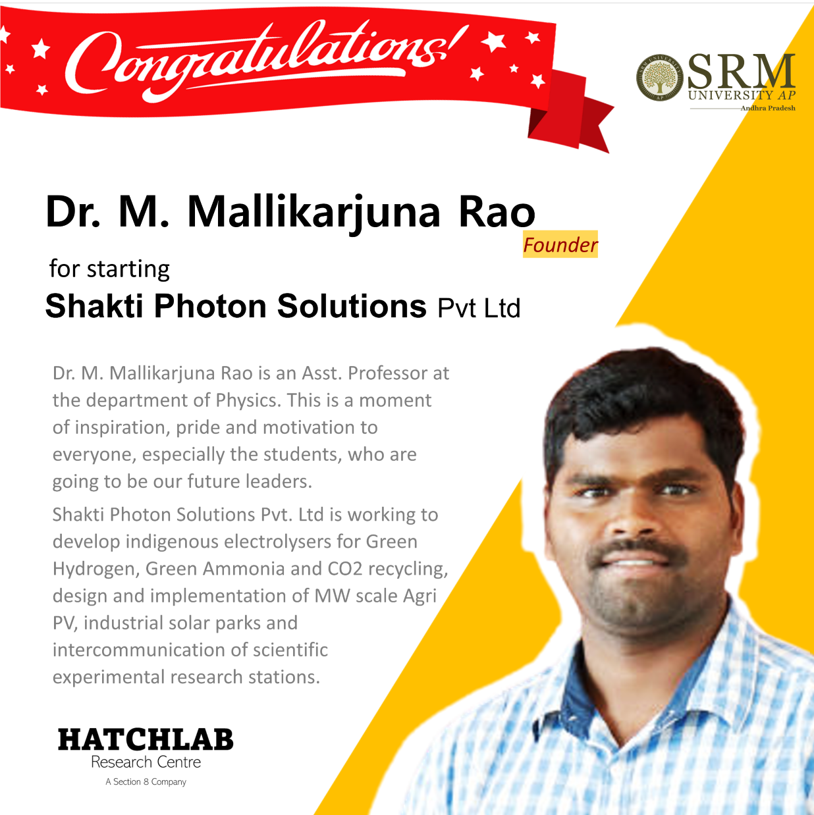
SRM University-AP manifests a supportive ecosystem for entrepreneurial ventures and start-ups with high potential from our ingenious students and faculty. The most recent faculty-led venture accomplishment was by Dr M Mallikarjuna Rao, Assistant Professor, Department of Physics who has established his very own start-up enterprise, Shakti Photon Solutions Pvt Ltd. The Hatchlab Research Centre and the Directorate of Innovation and Entrepreneurship had imparted unrelenting support to Dr Rao in materialising his inventive idea into actuality.
Shakti Photon Solutions Pvt. Ltd aims to develop Indigenous electrolysers for Green Hydrogen, Green Ammonia and CO2 recycling, Design and implement MW scale Agri PV, Industrial solar parks and Intercommunication of scientific experimental research stations. The venture has successfully completed the prototype phase and is ready for commercialisation and production.
Kudos to our faculty champions for their effort and dedication to great ventures with huge potential and for inspiring budding entrepreneurs to achieve success!
- Published in Departmental News, Faculty Achievements, IDEA NEWS, News
Book Review Published on the LSE Review of Books Website
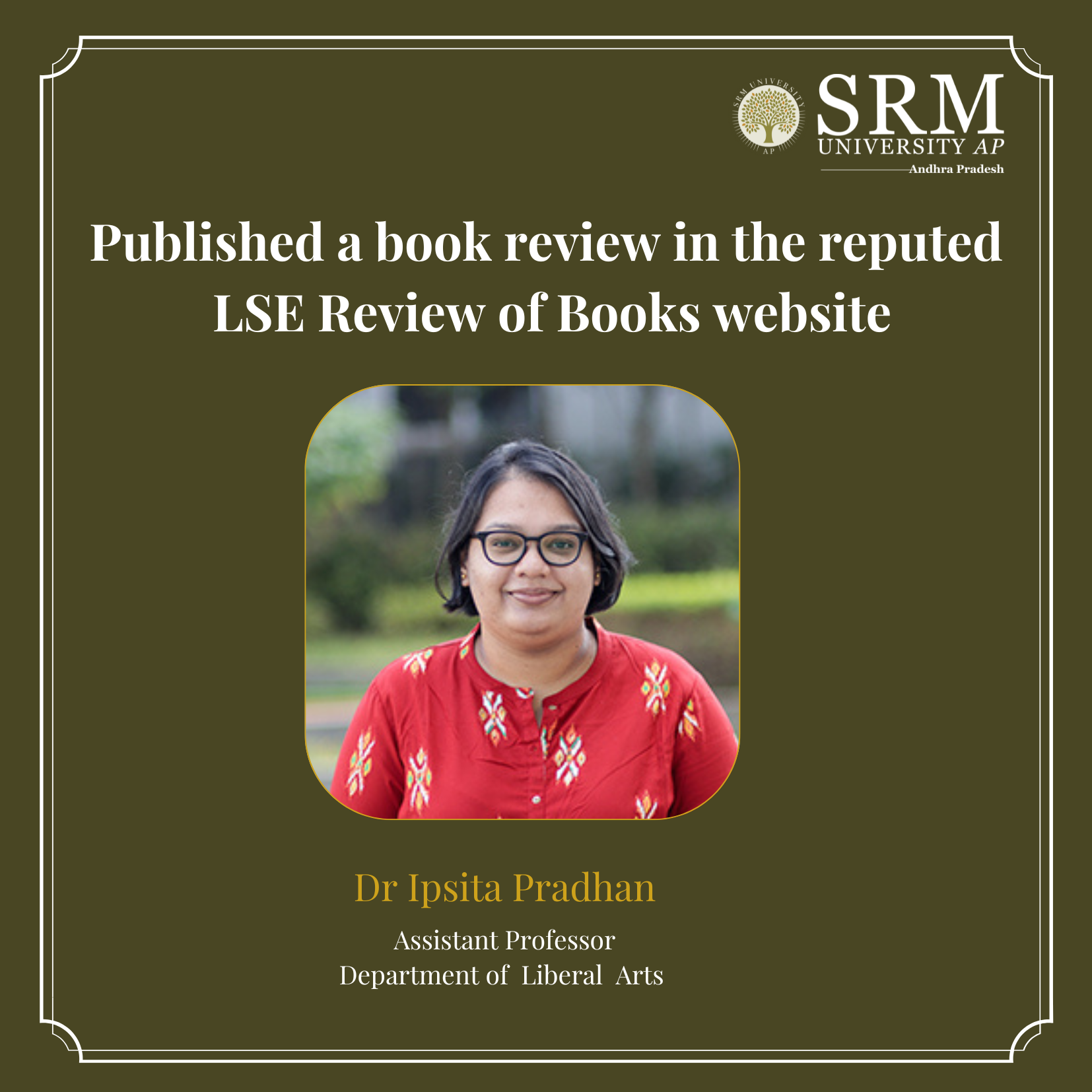 Assistant Professor Dr Ipsita Pradhan, Department of Liberal Arts, has recently published a book review on the renowned LSE Review of Books website. In her recent review, Dr Pradhan offers insightful perspectives on the book Confidence Culture by Shani Orgad and Rosalind Gill. This crucially important book appeals to media studies, American studies, and feminist scholars, as well as a wide public audience.
Assistant Professor Dr Ipsita Pradhan, Department of Liberal Arts, has recently published a book review on the renowned LSE Review of Books website. In her recent review, Dr Pradhan offers insightful perspectives on the book Confidence Culture by Shani Orgad and Rosalind Gill. This crucially important book appeals to media studies, American studies, and feminist scholars, as well as a wide public audience.
Dr Ipsita Pradhan elaborates on how the book assures that self-love affirmations in contemporary times are not free from the disciplinarian gaze of the market and its neoliberal capitalist mechanisms, as it is often measured through one’s productivity. She commends the authors’ rigorous research and compelling arguments, stating that the book offers a much-needed critique of the prevailing cultural narrative around confidence.
“In Confidence Culture, Shani Orgad and Rosalind Gill explore the demands that the cultural imperative of confidence particularly places on women. Enriched by abundant examples drawn from across popular culture to show how ‘confidence culture’ puts the onus on individuals to navigate and solve systemic problems, this book is necessary reading for scholars of gender, media studies and sociology”, writes Dr Ipsita Pradhan.
LSE Review of Books publishes daily reviews of academic books across the social sciences. It aims to facilitate the sharing and exchange of knowledge between experts within and outside the academy and to open up academic research to increase its impact. LSE Review of Books is a forum to encourage engagement with the latest academic publications across the social sciences and the humanities.
- Published in Departmental News, Faculty Achievements, Liberal Arts News, News
An appraisal of India’s comparative advantage in information technology exports
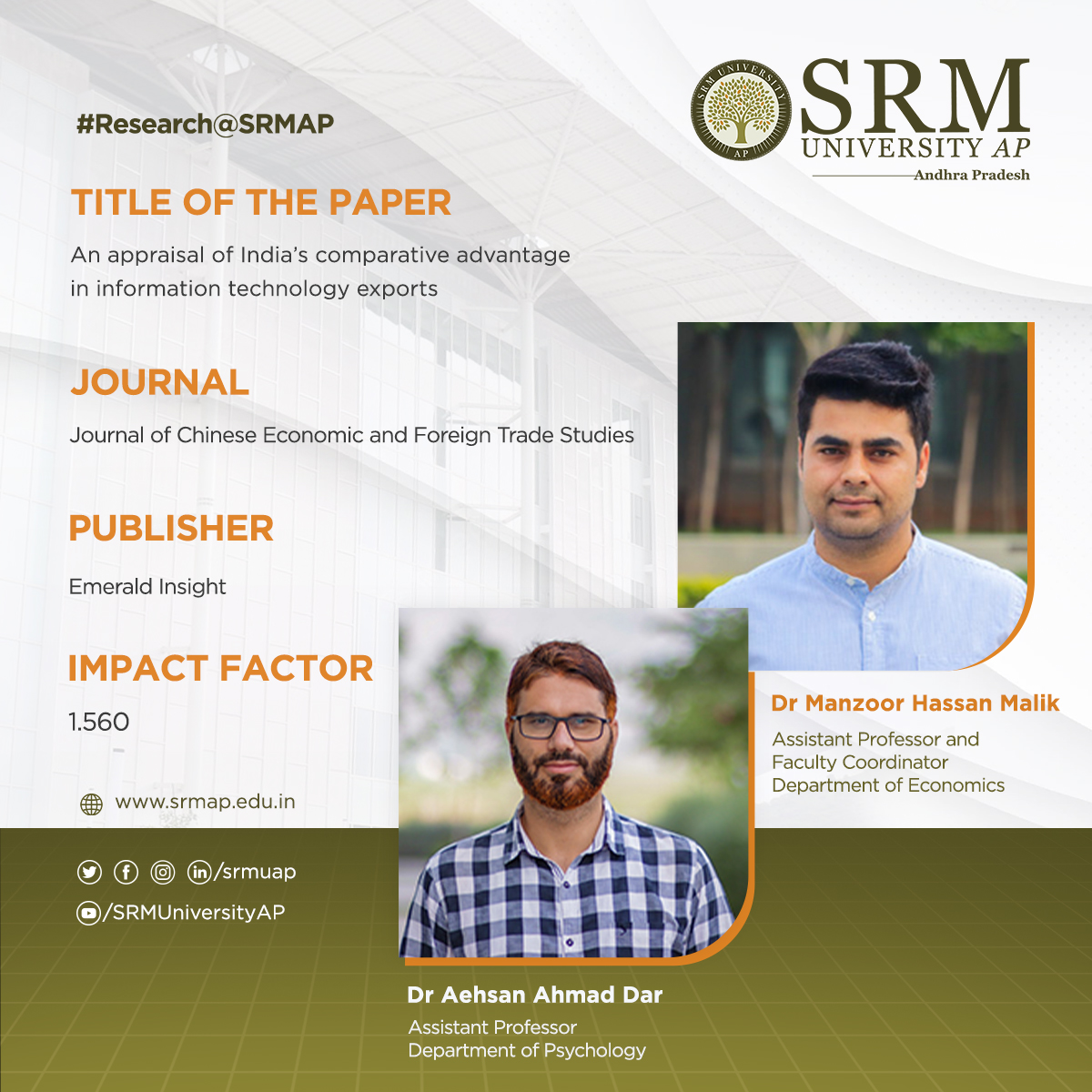 Researchers of the School of Liberal Arts and Social Sciences have worked on India’s comparative advantage in information technology exports with competing developing nations, including China, the Philippines, Malaysia, and Brazil. The latest paper published by Assistant Professor Dr Manzoor Hassan Malik, Department of Economics and Assistant Professor Dr Aehsan Ahmad Dar, Department of Psychology, has implications for attaining sustainability in IT export growth. It is suggested that policies are directed at enhancing the overall performance of the IT sector. The novelty of the present study lies in the estimation of India’s competitiveness in IT exports in relation to the group of reference countries, namely China, the Philippines, Malaysia, and Brazil. With its policy recommendations, this research is helping to shape the sustainability of the IT sector.
Researchers of the School of Liberal Arts and Social Sciences have worked on India’s comparative advantage in information technology exports with competing developing nations, including China, the Philippines, Malaysia, and Brazil. The latest paper published by Assistant Professor Dr Manzoor Hassan Malik, Department of Economics and Assistant Professor Dr Aehsan Ahmad Dar, Department of Psychology, has implications for attaining sustainability in IT export growth. It is suggested that policies are directed at enhancing the overall performance of the IT sector. The novelty of the present study lies in the estimation of India’s competitiveness in IT exports in relation to the group of reference countries, namely China, the Philippines, Malaysia, and Brazil. With its policy recommendations, this research is helping to shape the sustainability of the IT sector.
The paper titled An appraisal of India’s comparative advantage in information technology exports was published in the Journal of Chinese Economic and Foreign Trade Studies with an impact factor of 1.560.
Abstract
The purpose of this study is to estimate revealed comparative advantage and Normalised Revealed Comparative Advantage (NRCA) indices of India’s Computer and Information Services (CIS) export competitiveness about Information Technology (IT) competing developing nations, such as China, Philippines, Malaysia and Brazil. Using annual data of total exports for CIS, transportation (TNS), travel (TVL) and insurance (INS) services under service categories of the balance of payment, the present study estimates the pattern of Comparative Advantage (CA) in India’s CIS exports with respect to IT competing developing nations such as China, Philippines, Malaysia and Brazil from 2000 to 2018. The choice of the study period is determined by the availability of consistent data on IT service exports of these nations. The study also estimates the export position of CIS export in comparison to India’s traditionally strong commercial services export of TNS, TVL and INS during the study period. Both indices showed that India had a strong CA in CIS compared to the selected nations, indicating India’s relative export performance to be stronger than that of China, Malaysia, the Philippines, and Brazil. The cross-service index showed that India’s relative specialisation level in CIS with respect to the world’s average specialisation level was stronger than its relative specialisation level in TNS, TVL and INS services. Furthermore, The NRCA cross-nation index showed that India’s NRCA index score has been declining since 2010 with respect to these nations, which implied a decline in the competitiveness of CIS. On the other hand, NRCA has increased in the case of the Philippines, Malaysia and Brazil for most of the period post-2010.
- Published in Departmental News, Economics News, Faculty Achievements, News, Psychology News, Research News
DST SERB-SURE Grants Funding for Mathematics Project
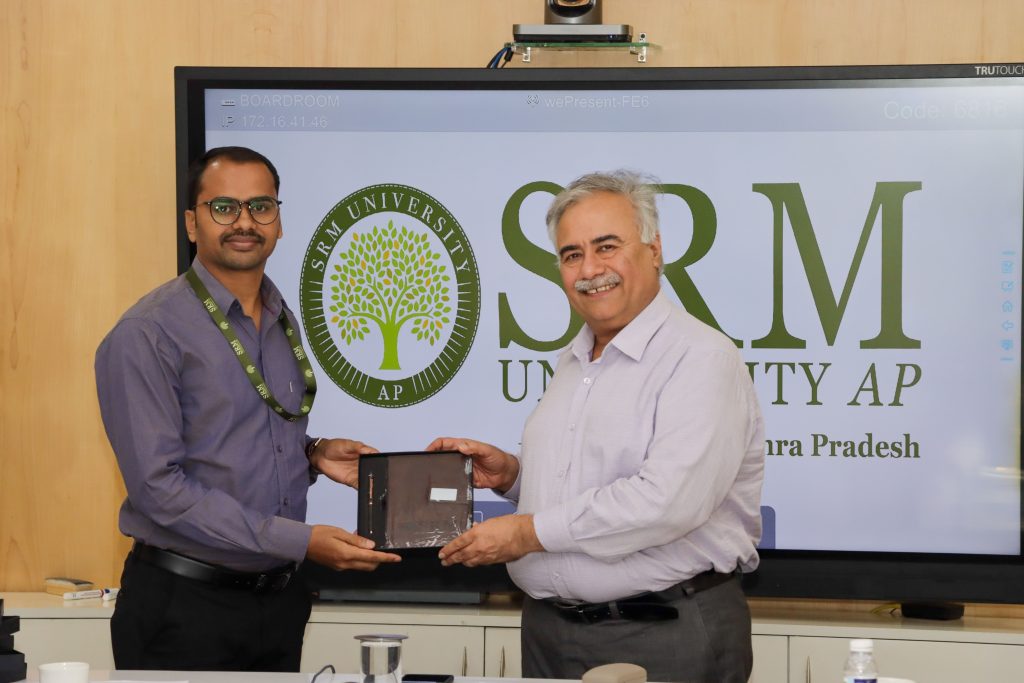
The Department of Mathematics is glad to announce that the project of Dr Sandeep Kumar Verma, Assistant Professor, titled “Investigation and development of wavelet transform and its applications in the framework of fractional Dunkl transform”, has been selected to be funded by DST, Govt. of India under SERB-SURE Scheme, securing an approved grant of 20.13 Lacs. Dr Sandeep Kumar Verma is the Principal Investigator of the project.
Title of the Project: Investigation and development of wavelet transform and its applications in the framework of fractional Dunkl transform
Approved Grant: 20.13 Lacs (As per university calculation)
Funded by: DST, Govt. of India under SERB-SURE Scheme
PI: Dr Sandeep Kumar Verma, Assistant Professor, Department of Mathematics
Project Summary: Dunkl operators are differential-difference operators associated with finite reflection groups in a Euclidean space. Dunkl transform is attracting widespread interest and giving us new perspectives on familiar topics from Harmonic Analysis and Partial Differential Equations. The fractional Dunkl transform (FRDT), which is introduced with one extra parameter, is the generalization of the well-known signal processing operations, such as the Fourier transform (FT), the fractional Fourier transform (FRFT), the Fresnel transform, Hankel transforms, fractional Hankel transforms, and the Dunkl transform. The FRDT will also find applications in the solution of optical systems, filter design, time-frequency analysis, and many others. The wavelet transforms (WT), which has had a growing importance in optics and signal processing, has been shown to be a successful tool for time-frequency analysis and image processing. It has found many applications in time-dependent frequency analysis of short-transient signals, data compression, optical correlators, sound analysis, representation of fractal aggregates, and many others.
The fractional wavelet transforms (FRWT) based on the fractional Fourier transform, which generalizes the classical wavelet transform, has proven potentially useful for signal processing, data compression, pattern recognition, and computer graphics. Thus, fractional wavelet transform gives more flexibility for time-frequency analysis than the usual wavelet transforms. As a generalization of the WT, a novel fractional Dunkl wavelet transform (FRDWT) can combine the advantages of the WT and the FRDT, i.e., it will be a linear transformation without cross-term interference and will be capable of providing multiresolution analysis and representing signals in the fractional domain. Simultaneously, compared to the Dunkl transforms, FRDT is more flexible for its one extra degree of freedom and can be used frequently in time-frequency analysis and non-stationary signal processing. Inspired by the fractional wavelet transform (FRWT), we introduce the concept of the (FRDWT), combining the idea of FRDT and WT. The proposed transform will not only inherit the advantages of multiresolution analysis of the WT, but also will have the capability of signal representations in the fractional Dunkl transform domain. Compared with the existing WT, the fractional Dunkl wavelet transform can offer signal representations in the time-fractional-frequency plane in the FRDT domain.
- Published in Departmental News, Faculty Achievements, Math News, News, Research News
Best Paper Award: Conferred to Dr Raviteja KVNS at RAISE 2023
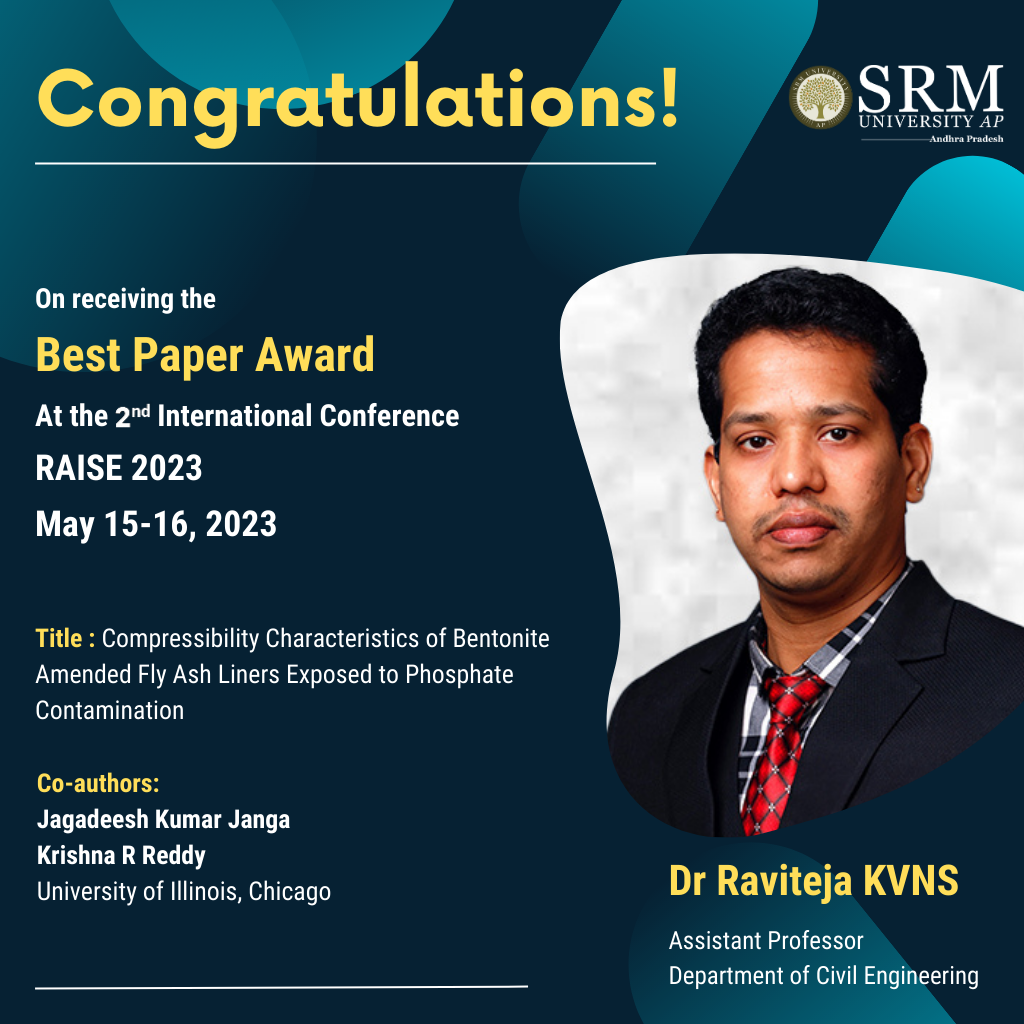
The Department of Civil Engineering is glad to announce that Dr Raviteja KVNS, Assistant Professor, has received the Best Paper Award for his paper titled “Compressibility Characteristics of Bentonite Amended Fly Ash Liners Exposed to Phosphate Contamination” at the 2nd International Conference RAISE 2023 (Recent Advances in Sustainable Environment) held on May 15-16, 2023. Dr Raviteja collaborated with Dr Janga Jagadeesh Kumar and Dr Krishna R Reddy, Civil, Materials and Environmental Engineering, University of Illinois Chicago for the research paper. Their cutting-edge research focused on developing alternate liner materials for waste containment systems.
Abstract
Waste containment systems like landfills, and impoundments are often lined with low permeable clays of hydraulic conductivity less than 10-7 cm/s. However, it is often challenging to get large volumes of low permeable clays near the project site. Conveyance of large volumes of clay from distant locations can be unsustainable due to the associated carbon emissions and energy costs, and not viable financially. Hence, there is a need to identify alternative liner materials without compromising on the containment capabilities. This study proposes the use of fly ash, amended with bentonite, as an alternative to the traditional liner systems. From preliminary studies, it is understood that a mixture of 80% fly ash amended with 20% bentonite is optimal to function as an effective liner material. However, the hydro-mechanical stability of liners needs to be investigated under different contamination scenarios. The present study reports the compressibility behavior of the proposed liner system under phosphate contamination, typically found in landfill leachate, impoundments, and stormwater retention ponds. One-dimensional consolidation tests were conducted on pure bentonite and fly ash with water to study the compressibility characteristics of individual materials. The optimum mix (80-20) was then tested at three different solutions exposure: water, 3.2 mg/L PO4-3-P and 12 mg/L PO4-3-P. It is depicted that the addition of 20% bentonite to fly ash did not affect the compressibility significantly, while the presence of phosphate contamination did not compromise the hydro-mechanical stability of the proposed liner system.
- Published in CIVIL NEWS, Departmental News, Faculty Achievements, News, Research News
Elected as General Secretary of ACDOS NMO-IFAC
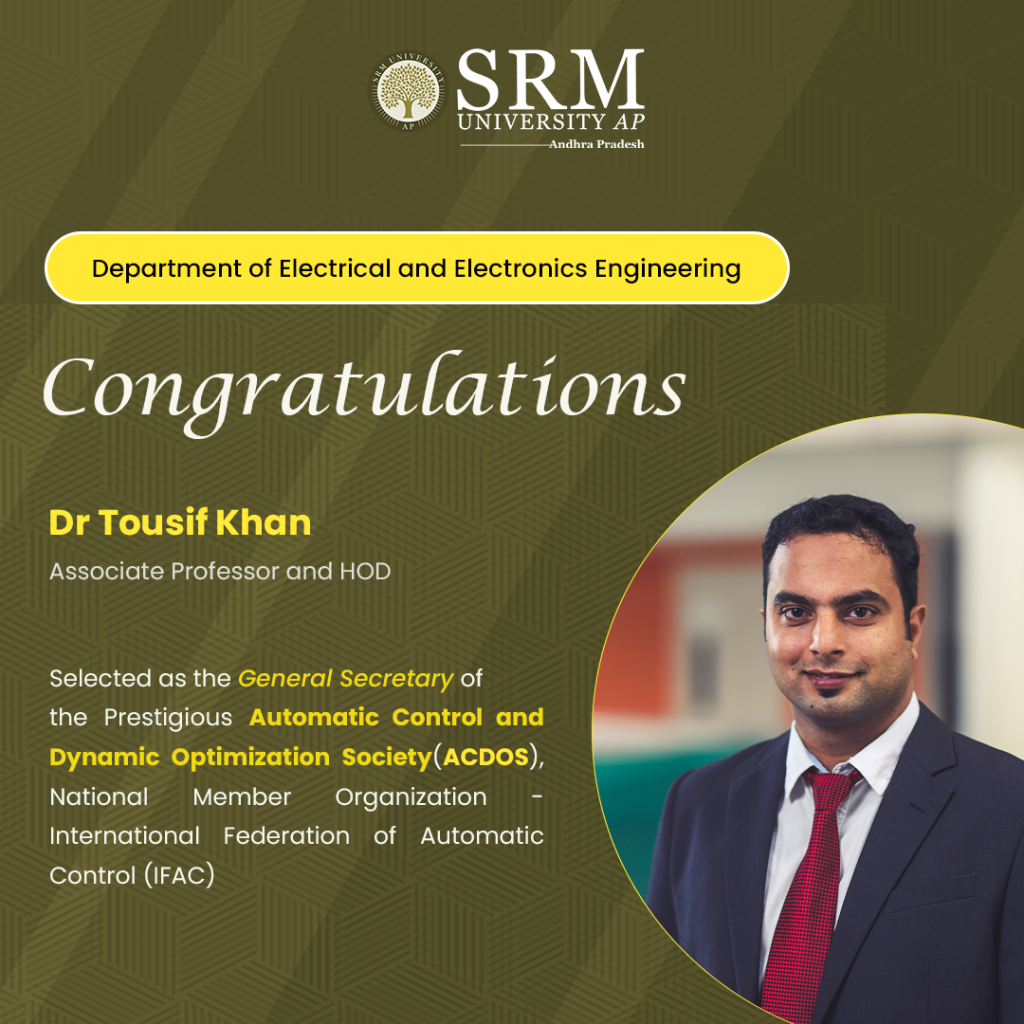
The Department of Electrical and Electronics Engineering is glad to announce that Dr Tousif Khan, Associate Professor and HOD, has been selected as the General Secretary of the Prestigious Automatic Control and Dynamic Optimization Society (ACDOS), National Member Organisation of the International Federation of Automatic Control (IFAC), at the Governing Council meeting held on June 22, 2023.
Automatic Control & Dynamic Optimization Society (ACDOS) was established in 2011 with the noble objective to promote automatic control and dynamic optimization discipline in academia and industry across India. The society aims to host international conferences and technical workshops regularly in order to promote close interaction between industry and academia. The society also participates in curriculum development for graduate and undergraduate studies and facilitates productive research in this field. The society also volunteers to honour eminent persons who excelled in this field in industry and academic circles.
Congratulations to Dr Tousif for this remarkable accomplishment and for further contributing to the university’s rising reputation among national and international frontiers!
- Published in Departmental News, EEE NEWS, Faculty Achievements, News

